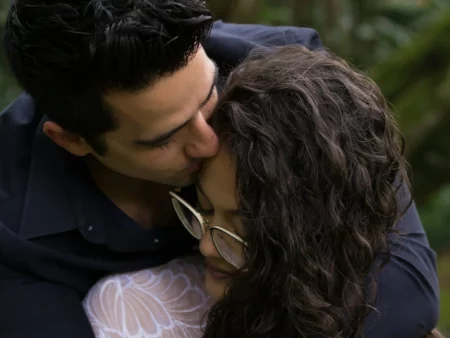Unraveling the enigma of jealousy in relationships can be as complex as decoding a cryptic message. Yet, understanding these subtle cues is crucial for navigating the intricate landscape of human emotions. When a man exhibits signs of jealousy, it’s not merely a reaction; it’s a window into his deeper feelings and insecurities. This emotional behavior often stems from a place of intense interest or fear of losing a valued connection.
As we delve into the 15 telltale signs, remember that each expression of jealousy is unique, colored by individual experiences and the dynamics of the relationship. By learning to observe and interpret these signals, you’ll gain invaluable insights into your partner’s emotional world, fostering deeper understanding and stronger trust. This journey of emotional intelligence can transform how you notice, react, and respond to your partner’s concerns, ultimately strengthening your bond.
Understanding Male Jealousy: A Window into His Emotions
Decoding male emotional expression reveals a complex interplay of societal norms and personal histories. When a man tries to hide his feelings, it often stems from a deep-seated fear of vulnerability. This protective instinct manifests as subtle cues that require keen observation.
Understanding male emotional responses involves recognizing that men may:
- Express concern through actions rather than words
- Show affection indirectly, often through acts of service
- React to perceived threats with heightened attention to their partner
- Doubt their own worth when faced with accomplished partners
- Assume a protective stance as a way to demonstrate care
- Watch for subtle signs of approval or disapproval
- Become overly attentive to compensate for insecure feelings
- Question their role in the relationship when feeling uncertain
These behaviors often reflect an internal struggle between societal expectations and genuine emotions. Men may wonder how to balance their feelings with perceived masculinity, leading to complex expressions of attachment. It’s crucial to recognize these nuances and foster an environment where open communication thrives.
By acknowledging these patterns, partners can cultivate deeper understanding, encouraging men to feel secure in expressing emotions authentically. This approach paves the way for more thoughtful and caring interactions, strengthening trust and mutual respect in relationships.
15 Tell-Tale Signs He’s Jealous (And What They Mean)
Understanding a man’s signs of concern requires nuanced observation. While individual behaviors can be misleading, patterns often reveal deeper sentiments. Context and frequency are crucial, as indicators may stem from past experiences or personal vulnerabilities. By collectively assessing these cues, you gain insights into his motivations, enabling open dialogue. This approach helps address underlying issues, fostering a stronger bond built on mutual understanding and respect. Consider each sign as a piece of a larger puzzle to decipher.
1. He Becomes Overly Attentive
When a partner suddenly becomes overly attentive, it may signal underlying concerns. This shift in behavior often manifests as increased check-ins, unexpected gifts, or heightened physical affection. While such actions might seem endearing, they can mask deeper insecurities or a need to make a stronger impression.
Sudden spikes in attentiveness often stem from a place of uncertainty. It’s crucial to discern whether this behavior stems from genuine care or a need to alleviate personal anxieties. Partners may become more sensitive to perceived threats, leading to a desire to protect the relationship.
Understanding the fine line between healthy attention and possessive behavior is key. Open communication can help unravel the motivations behind these actions, addressing any cause for worry and fostering a more secure partnership.
2. He Questions Your Whereabouts
Constant inquiries about your whereabouts can be unsettling. This behavior may indicate underlying trust issues, often stemming from a desire to safeguard the relationship. It’s essential to differentiate between genuine interest and excessive control. If you find yourself accounting for every moment, it’s time to address the root cause. Open dialogue can help uncover motivations and establish healthier communication patterns. Trust forms the foundation of any strong relationship. While feeling uncertain is natural, allowing these feelings to manifest as constant surveillance can erode intimacy. Instead, focus on building mutual respect and transparency to alleviate the need for constant monitoring. This approach fosters a more secure and trusting partnership.
3. His Body Language Changes Around Others
Body language speaks volumes, especially when emotions run high. A subtle shift in posture or fleeting expression can reveal underlying signs of discomfort. Around others, a partner’s stance may become rigid, shoulders squaring protectively. Their gaze might dart between you and perceived rivals, betraying inner turmoil. Crossed arms or clenched fists signal defensiveness, while leaning in excessively or placing a hand on your back can mark territorialism. These non-verbal cues often surface before conscious awareness, making them particularly telling.
By attuning yourself to these subtle shifts, you can become more perceptive to your partner’s unspoken concerns, addressing potential issues before they escalate. This awareness fosters better understanding and communication within the relationship.

4. He Makes Sarcastic Comments
Sarcasm often masks deeper emotions, serving as a shield for vulnerability. When a partner resorts to biting remarks or veiled criticisms, it may indicate underlying unease. These comments could target perceived rivals or situations that trigger insecurity. For example, “Oh, I’m sure your coworker is just being friendly” might actually mean “I’m uncomfortable with your relationship.” Similarly, “You look great tonight. Planning to impress someone?” could reveal fears about potential competition.
Such remarks aim to provoke a reaction, seeking reassurance without directly expressing concern. Recognizing these verbal cues allows for open dialogue, addressing the root causes of unease and fostering a more secure bond built on honest communication. Understanding these subtle signs can lead to healthier interactions and stronger partnerships.
5. He Tries to Make You Jealous in Return
Reciprocal jealousy often emerges as a misguided attempt to level the emotional playing field. When a partner feels threatened, they may orchestrate scenarios to provoke similar feelings in their significant other. This could involve flirting with others, mentioning past relationships, or becoming secretive about activities. Such behavior stems from a desire to regain perceived lost power or attention.
However, this tactic rarely addresses the root cause of insecurity and can create a cycle of mistrust. Recognizing this pattern is crucial for breaking free from destructive dynamics and fostering open communication. By addressing underlying fears and building mutual understanding, couples can move towards a more secure and trusting partnership. These signs often indicate deeper relationship issues that require attention.
7. He Becomes Overly Protective
Heightened protectiveness can manifest as a subtle sign of underlying emotional turmoil. While genuine concern for a partner’s well-being is natural, excessive vigilance may indicate deeper insecurities. Healthy protectiveness involves respectful support and open communication, allowing for personal autonomy. In contrast, possessive behavior often restricts freedom and erodes trust. Partners might excessively monitor activities, discourage independent pursuits, or display unwarranted suspicion. Recognizing the distinction is crucial for maintaining a balanced relationship.
Addressing these behaviors requires empathy and honest dialogue to uncover root causes and establish healthier boundaries. By fostering mutual understanding and respect, couples can navigate these complex emotions, strengthening their bond while preserving individual identities. This approach cultivates a secure environment where both partners can thrive independently and together.
8. He Criticizes Your Male Friends or Colleagues
Criticism of your male friends or colleagues often indicates deep-seated insecurities. A partner may view these relationships as threats, attempting to undermine their importance through subtle jabs or outright disparagement. This behavior aims to create distance between you and others. However, diverse social connections are vital for personal growth and well-being. Healthy partnerships encourage individual friendships, recognizing their value in fostering a balanced life. Addressing this issue requires open dialogue, emphasizing trust and mutual respect. By acknowledging your partner’s concerns while asserting the importance of your friendships, you can work towards a more secure and supportive dynamic. True partnership enhances your life, not restricts it.
9. He Constantly Seeks Reassurance
Constant reassurance-seeking often stems from deep-rooted insecurities, reflecting fears of abandonment or inadequacy. This pattern drives individuals to repeatedly seek validation, straining relationships and creating an exhausting cycle of emotional dependence.
The need for constant reassurance often masks fragile self-esteem. It’s a temporary balm for deeper wounds that require genuine self-reflection and growth to heal. Research shows that 35% of couples struggle with this issue, impacting relationship satisfaction.
While occasional reassurance is normal, excessive seeking indicates unresolved personal issues. Addressing root causes through open communication and professional guidance can foster healthier dynamics, breaking the cycle of insecurity-driven signs of relational distress.
10. He Exhibits Hot and Cold Behavior
Inconsistent behavior can be a subtle sign of underlying emotional turmoil. Partners alternating between warm affection and cold distance may grapple with conflicting desires for closeness and independence. This hot-and-cold pattern often stems from fear of vulnerability or past trauma, manifesting as sudden mood swings, unpredictable communication, or fluctuating intimacy levels. While occasional shifts are normal, persistent inconsistency may indicate deeper issues. It can create confusion and instability in the relationship, leaving partners feeling uncertain about where they stand. Open dialogue and professional guidance can help unravel root causes, fostering a more stable connection. By addressing these patterns, couples can work towards building a foundation of trust and emotional consistency.
11. He Tries to Control Your Appearance
Attempts to control your appearance can be a subtle manifestation of deeper insecurities. A partner may suggest wardrobe changes or criticize your style choices, framing it as helpful advice. This behavior often stems from a desire to minimize perceived threats or assert dominance. While occasional style suggestions can be harmless, persistent attempts to dictate your look erode personal autonomy. Healthy relationships celebrate individuality, allowing each person to express themselves freely.
Recognizing these signs early enables open dialogue about boundaries and respect. Ultimately, your appearance is a personal choice, reflecting your unique identity. Addressing such controlling tendencies fosters mutual understanding and reinforces the importance of maintaining individuality within a partnership. Open communication and setting clear boundaries are crucial in navigating these situations effectively.
12. He Becomes Clingy or Possessive
Excessive clinginess can signal deeper emotional issues. While healthy relationships thrive on mutual support, possessive behavior stifles individual growth. A partner who constantly demands attention or limits personal space may be grappling with insecurities, often stemming from fear of abandonment or low self-esteem. Recognizing the difference between genuine care and suffocating attachment is crucial.
Healthy couples maintain separate identities while nurturing their bond, respecting independence. Open communication and clear boundaries can address underlying issues, fostering a balanced connection. Professional guidance may help navigate these complex dynamics, building a foundation of trust. Ultimately, a secure relationship allows both partners to grow individually and together.
13. He Overreacts to Innocent Situations
Misinterpreting innocent interactions often stems from deep-seated insecurities, leading to disproportionate reactions. A casual conversation with a coworker might spark accusations of flirting, while a delayed text response could trigger unfounded suspicions. These overreactions typically manifest as heated arguments, silent treatments, or passive-aggressive comments. Such behaviors erode trust, creating a tense atmosphere that can push partners away.
The impact on relationships can be profound, fostering resentment and communication breakdowns. Addressing these signs early is crucial to prevent long-term damage. Open dialogue about underlying fears and establishing clear boundaries can help mitigate these issues, fostering a healthier partnership built on mutual understanding and respect. Recognizing and addressing these patterns is essential for maintaining a strong, trusting connection.
14. He Compares Himself to Others
Constant self-comparison often reveals deep-rooted insecurities that can erode relationships. When a partner frequently measures himself against others—be it in terms of career success, physical appearance, or social status—it signals an underlying lack of self-esteem. This behavior can manifest as subtle comments or overt statements, reflecting inner turmoil rather than genuine confidence. Healthy partnerships thrive on mutual support and individual growth, not competitive comparisons.
Addressing these insecurities requires open dialogue and a focus on building self-worth independent of external validation. By fostering a supportive environment where both partners feel valued for their unique qualities, couples can strengthen their bond and overcome the destructive cycle of comparison. Recognizing these signs early allows for proactive steps towards fostering a more secure and fulfilling relationship built on mutual respect and understanding.
15. He Opens Up About His Jealousy
When a partner openly discusses feelings of jealousy, it often signals a willingness to address relationship concerns constructively. This vulnerability can foster deeper intimacy and understanding. By acknowledging these emotions, individuals demonstrate self-awareness and commitment to growth. Open dialogue creates opportunities to explore underlying insecurities, set healthy boundaries, and strengthen mutual trust. It’s crucial to approach these conversations with empathy and without judgment.
Encouraging honest expression while maintaining respect for each other’s perspectives leads to more robust relationships. The ability to communicate openly about challenging emotions is a hallmark of emotional maturity. Couples who navigate jealousy together often find their bond strengthened through increased transparency and mutual support.

Addressing Jealousy: Communication Strategies for Couples
Effective communication forms the cornerstone of addressing jealousy in relationships. By fostering openness and understanding, couples can navigate these complex emotions together. Here are strategies to manage jealousy constructively:
- Practice active listening without judgment
- Express feelings using “I” statements to avoid blame
- Establish clear, mutually agreed-upon boundaries
- Regularly check in on emotional needs and concerns
- Cultivate individual interests and friendships outside the relationship
- Challenge negative thought patterns through self-reflection
- Engage in trust-building exercises together
- Seek professional guidance if issues persist
- Develop empathy by understanding your partner’s perspective
- Practice gratitude for positive aspects of your relationship
- Encourage open discussions about past experiences influencing current emotions
- Set realistic expectations for the relationship
Addressing jealousy requires patience and commitment from both partners. Implementing these strategies consistently can strengthen bonds and create a more secure relationship. Approach discussions with empathy and willingness to understand each other’s perspectives, fostering a supportive environment where both individuals feel valued and respected. Remember, healthy relationships thrive on mutual trust and open communication.
When Jealousy Becomes a Red Flag: Recognizing Toxic Behavior
Recognizing when jealousy crosses the line into toxic behavior is crucial for maintaining healthy relationships. While mild concern can be normal, persistent patterns of control, manipulation, or aggression are red flags. Watch for behaviors like excessive monitoring, isolating you from friends and family, or frequent baseless accusations. These actions erode trust and individual autonomy. Toxic patterns often stem from deep-seated insecurities and can escalate into emotional or even physical abuse. It’s essential to establish clear boundaries and communicate openly about concerns.
If addressing the issue directly doesn’t lead to positive change, seeking professional help or considering the relationship’s future may be necessary. Remember, healthy partnerships are built on mutual trust, respect, and support. Recognizing and addressing harmful signs early can prevent long-term damage and foster healthier dynamics. Prioritize open dialogue and mutual understanding to navigate these challenges effectively.
Conclusion: Balancing Emotions and Trust in Relationships
Navigating the emotional landscape of relationships requires a delicate balance of trust, communication, and self-awareness. Recognizing nuanced signs of concern and addressing them constructively fosters deeper connections. While occasional unease is natural, persistent patterns may indicate underlying issues needing attention. By cultivating open dialogue, respecting boundaries, and nurturing individual growth, couples build resilience against insecurities.
Healthy relationships thrive on mutual support, not control. The goal is creating a secure environment where both partners feel valued, understood, and free to express themselves authentically. With patience, empathy, and commitment to growth, couples can transform challenges into opportunities for strengthening their bond. This approach cultivates a foundation of trust and understanding, essential for long-term relationship success.
FAQs About Jealousy in Relationships
How can I tell if my partner's jealousy is rooted in love or insecurity?
Loving partners express concerns openly, prioritizing well-being and trust. Insecure individuals often display controlling behaviors, make unfounded accusations, and struggle with self-esteem. Context and communication are key to identifying motivations behind signs of concern in relationships. Observing patterns helps distinguish genuine care from insecurity.
What's the best way to address my own feelings of jealousy in a relationship?
Self-reflection is key to addressing personal jealousy. Identify triggers and insecurities. Communicate openly without blame. Practice self-care and confidence-building. Set healthy boundaries together. Seek professional help if needed. Cultivate trust and gratitude. Recognize positive signs of personal and relationship growth.
Are there cultural differences in how jealousy is expressed or perceived?
Cultural influences shape jealousy expression and perception. Some societies view it as love, others as disrespect. Eastern cultures emphasize collective harmony, potentially suppressing overt displays. Western individualism may lead to direct confrontations. Understanding these nuances is crucial for navigating cross-cultural relationships. Recognizing diverse signs fosters mutual respect.
Can professional help improve a relationship affected by excessive jealousy?
Professional help can significantly improve relationships affected by excessive jealousy. Therapists provide tools to address underlying issues, enhance communication, and rebuild trust. Couples counseling offers a safe space to explore emotions and set boundaries. Individual therapy can help address personal signs of insecurity.

Jeffrey Young is an American psychologist renowned for developing schema therapy. He founded the Schema Therapy Institute and is a leader in the field of cognitive behavioral therapy. Young has authored several influential books, including Schema Therapy for professionals and Reinventing Your Life for the general public.







